Kering, il super compenso di Luca De Meo: ma nel 2015 Marco Bizzarri guadagnava di più
- Postato il 8 agosto 2025
- Di Panorama
- 3 Visualizzazioni

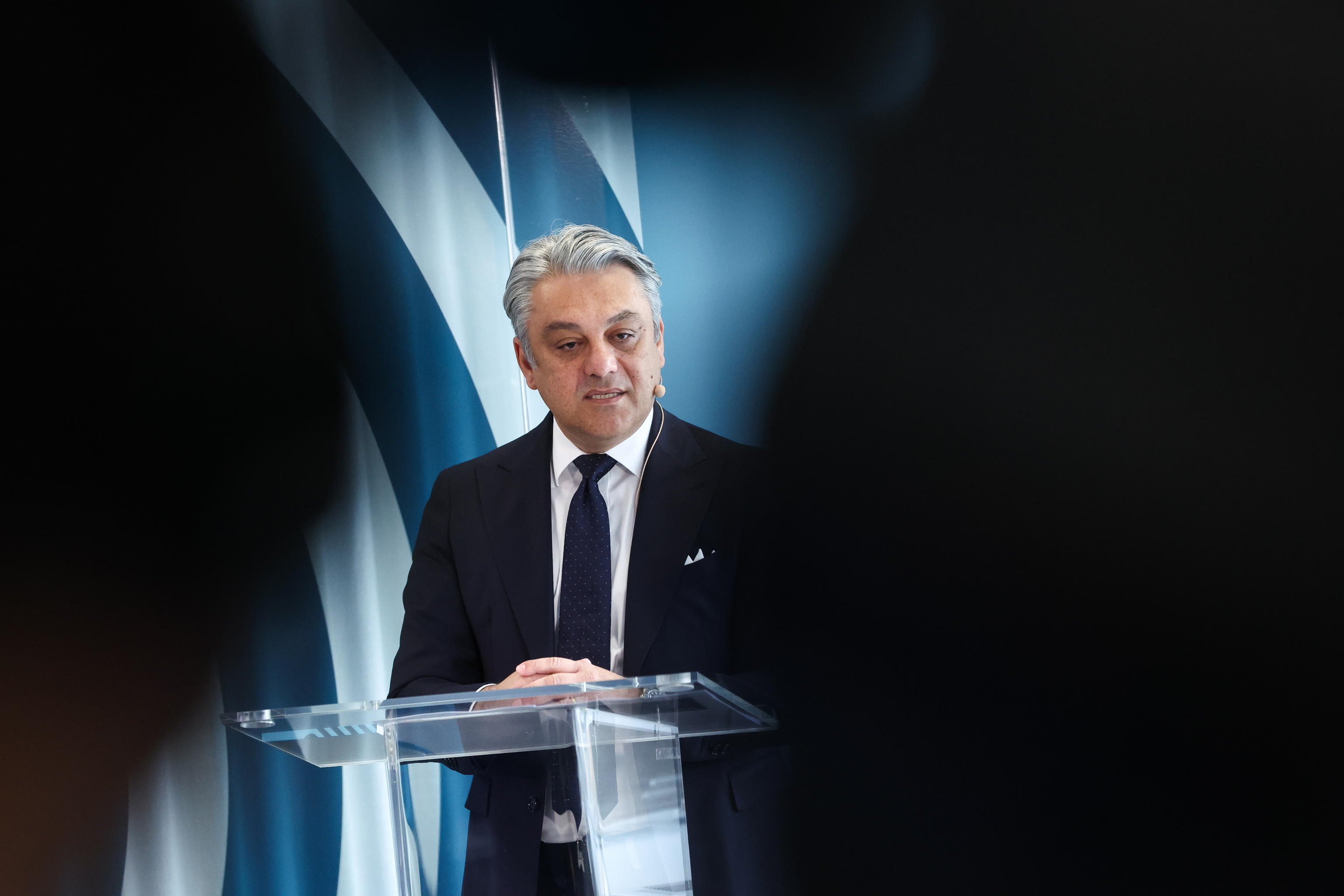
Il pacchetto de Meo
L’avviso di convocazione dell’Assemblea Generale Mista del Gruppo Kering prevista per il prossimo 9 settembre alle ore 15 ha registrato grande attenzione da parte della stampa e dei commentatori che hanno analizzato nel dettaglio il pacchetto di remunerazione proposto a Luca De Meo, nuovo Direttore Generale del Gruppo.
Questo prevede un compenso fisso annuale lordo di Euro 2.200.000,00 all’anno assortito di un bonus annuale lordo che, ad obiettivi raggiunti, si eleva al 220% del fisso ed è pari dunque ad Euro 4.840.000,00 lordi all’anno. Per il caso di “overperformance” (cioè di risultati che eccedono gli obiettivi) è previsto un complemento di bonus annuale lordo pari ad ulteriori Euro 1.760.000 lordi all’anno.
Inoltre, il nuovo CEO del Gruppo Kering avrà diritto ad un piano di incentivazione a lungo termine che, a condizione di aver maturato una presenza nel Gruppo di almeno tre anni, gli attribuirà azioni Kering per un valore pari al 150% dell’aggregato della sua remunerazione fissa e variabile nell’anno precedente. Quindi, per il caso base degli obiettivi raggiunti, il prossimo demiurgo del business di Kering riceverà, in aggiunta al fisso ed al bonus, titoli del colosso francese del lusso per un controvalore di ben Euro 10.560.000,00.
Tutto quanto sopra per una remunerazione complessiva annua lorda, ad obiettivi raggiunti, pari ad Euro 17.600.000,00 una volta maturato almeno un triennio di presenza nel Gruppo.
Infine, grande scalpore fra i commentatori ha destato la decisione del Consiglio di Amministratore di attribuire al top manager un bonus d’ingresso pari ad Euro 20 milioni a fini di compensazione degli elementi retributivi non maturati da De Meo a seguito della sua decisione di dimettersi da Renault per unirsi al Gruppo Kering.
I commenti della stampa
E, sull’onda di questi numeri, i media hanno titolato rilevando la straordinarietà dei valori in gioco e del trattamento riservato alla nuova star del management di Kering. Così l’autorevole Liberation che esclama «Gros Lot!» che in italiano si traduce «Bingo!» e titola «le jackpot pour Luca De Meo à Kering». Pure l’eminente Le Monde ha titolato «l’enorme cheque de bienvenue de Luca De Meo chez Kering». E così l’insigne Les Echos riassume la notizia con «Kering : le généreux cadeau de bienvenue de Luca de Meo pour son arrivée».
Ma è veramente così ? Il trattamento riservato al nuovo salvatore designato di Kering è davvero così eccezionale e generoso?
A me non pare proprio.
Già a partire da dieci anni fa Bizzarri ha preso di più
Infatti, il paragone con la remunerazione dell’altro star CEO del Gruppo Kering, Marco Bizzarri, suggerisce il contrario.
Già, infatti, il 26 gennaio 2018, il rispettato periodico indipendente francese Mediapart aveva pubblicato un’e-mail riservata del 17 dicembre 2014 (riportata qui sotto) inviata a Marco Bizzarri da Jean-François Palus, direttore generale delegato e numero due di Kering, con François-Henri Pinault in copia. In quel momento erano in corso le ultime concitate trattative propedeutiche alla designazione di Marco Bizzarri alla carica di amministratore delegato del marchio della Doppia G in sostituzione dell’uscente Patrizio Di Marco. E il documento svelato da Mediapart e riportato qui sotto mostra che tale trattativa fu condotta direttamente dal Presidente Pinault e riguardava non uno stipendio lordo, bensì uno stipendio ultra netto («que la négociation a été menée directement par Pinault, et qu’elle portait sur un salaire ultra net» riporta Mediapart). In particolare, nell’email incriminata, Palus scriveva, con in copia Pinault, «Dopo la tua discussione con François-Henri, è tornato da me con un obiettivo di retribuzione netta annua (ad obiettivi raggiunti) di 8 000 K€». Il che vuol dire un trattamento netto, nel caso di obiettivi raggiunti, di otto milioni di Euro.
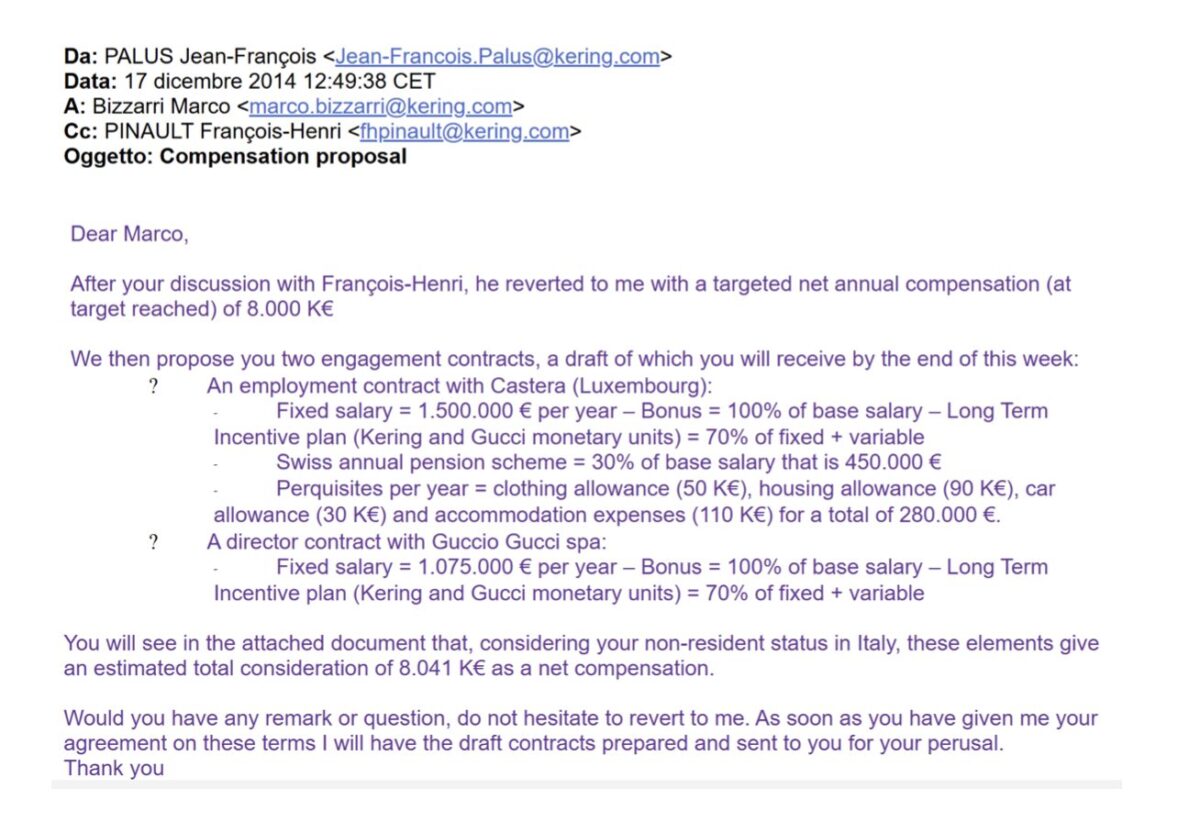
Le carte interne di Pinault
E l’email di Palus del 17 dicembre 2014 continua nell’illustrare le elaborate modalità di erogazione volte a garantire al neo CEO di Gucci la predetta remunerazione netta, ad obiettivi raggiunti, di 8 milioni di Euro. Queste modalità riposavano su un doppio contratto: l’uno di mandato sociale con la società italiana titolare del marchio Gucci, Guccio Gucci Spa, l’altro di lavoro dipendente con l’opaca scatola vuota lussemburghese Castera Sarl, vero stipendificio esentasse messo a punto dal Gruppo Kering per erogare in gran segreto compensi netti ad un gruppo di manager e collaboratori.
Palus, infatti, scrive, con in copia il Presidente Pinault
Ti proponiamo quindi due contratti di assunzione, di cui riceverai una bozza entro la fine di questa settimana:
Un contratto di lavoro con Castera (Lussemburgo):
– Stipendio fisso = 1.500.000 € all’anno – Bonus = 100% dello stipendio base – Piano di incentivazione a lungo termine (unità monetarie Kering e Gucci) = 70% dello stipendio fisso + variabile
– Regime pensionistico svizzero = 30% dello stipendio base, pari a 450.000 €
– Benefici accessori annuali = indennità di abbigliamento (50 K€), indennità di alloggio (90 K€), indennità di auto (30 K€) e spese di alloggio (110 K€) per un totale di 280.000 €.
Contratto di amministratore con Guccio Gucci spa:
– Stipendio fisso = 1.075.000 € all’anno – Bonus = 100% dello stipendio base – Piano di incentivazione a lungo termine (unità monetarie Kering e Gucci) = 70% della retribuzione fissa + variabile
Il tutto per concludere come si legge nel successivo paragrafo dell’email: «come potrai vedere nel documento allegato, considerando il tuo status di non residente in Italia, tali elementi danno luogo a un corrispettivo complessivo stimato pari a 8.041 K€ a titolo di compenso netto».
Questo in coerenza con quanto dettagliato nel documento che Palus allega all’email in cui si legge quanto segue:
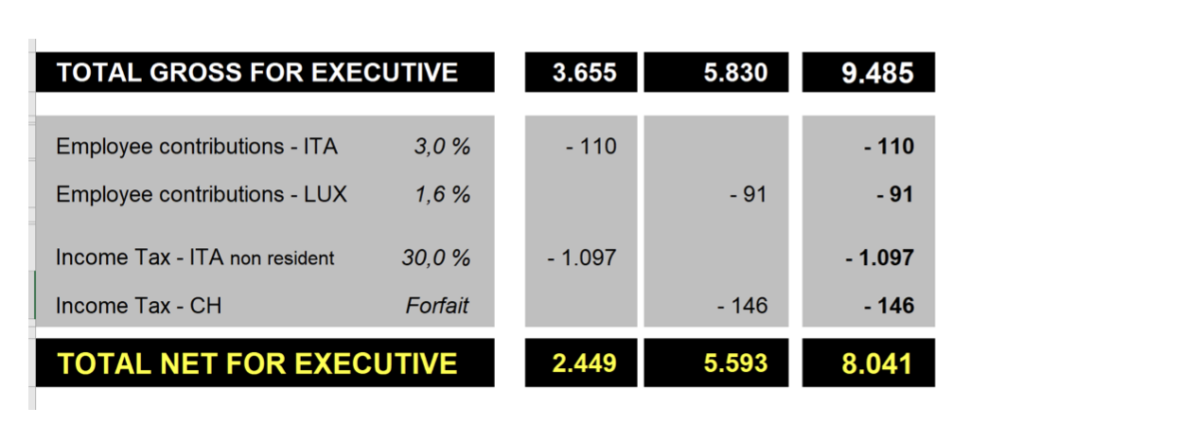
Insomma, tutto questo significa che, già alla fine del 2014, Kering erogava a Bizzarri un pacchetto retributivo complessivo, ad obiettivi raggiunti, pari ad un netto annuo di Euro 8 milioni e 41 mila.
Ciò era reso possibile dal sapiente uso da parte del Gruppo di vari costrutti fiscali quali la residenza fiscale in Svizzera del manager che vi godeva del regime forfettario e il versamento della maggior parte della remunerazione da un’inconsistente società lussemburghese che non prelevava alcuna ritenuta alla fonte su quanto pagato.
È noto, però, che quando, a seguito dello scoppio dello scandalo fiscale Kering, Bizzarri riportò la propria residenza ed il proprio contratto di collaborazione in Italia, Kering continuò a garantire il medesimo netto al manager raddoppiandone la remunerazione lorda e quasi triplicando il proprio costo azienda.
Il netto di de Meo
Ma se, per il caso base di obiettivi raggiunti, a Marco Bizzarri fu garantito un netto di oltre 8 milioni di Euro, bisogna chiedersi che netto percepirà De Meo nel quadro della proposta resa nota da Kering e che verrà sottoposta all’Assemblee Generale Mista del prossimo 9 settembre?
Ebbene la risposta è la seguente: meno di quello che fu garantito a Bizzarri a partire dal 2015.
Infatti, il trattamento complessivo lordo di 17.600.000,00 Euro attribuito a De Meo per il caso di obiettivi raggiunti sconta dei prelievi sociali e fiscali che, secondo il modello di calcolo dell’URSAFF largamente utilizzato in Francia, portano il netto per De Meo a circa 7.850.000 all’anno.
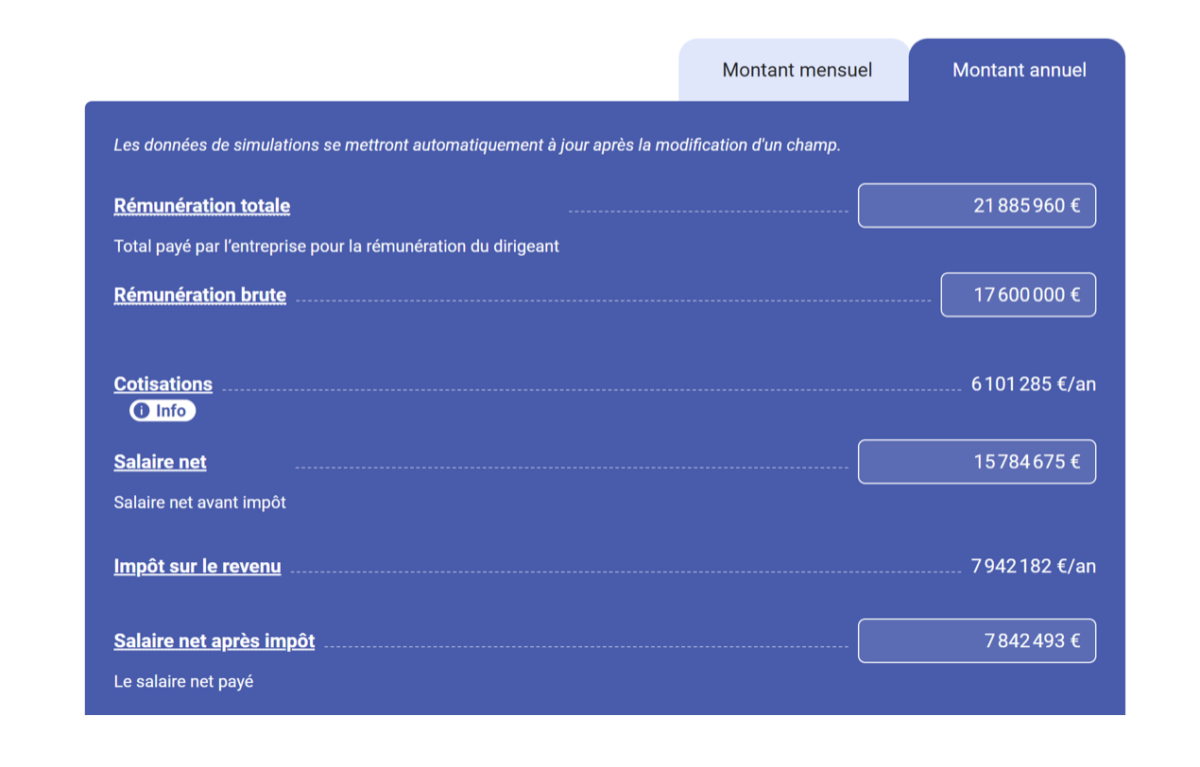
Applicando poi la contribuzione eccezionale sugli alti redditi (Contribution Exceptionelle sur les Hauts Revenus) pari al 4% sui redditi superiori ad Euro 500.000,00, il netto di De Meo scende di ulteriori 600.000,00 Euro circa e si attesta intorno a 7.250.000,00
I calcoli non possono ovviamente essere accuratissimi perché non sono noti molti dettagli della remunerazione di De Meo e della sua complessiva posizione fiscale (regime di imposizione, familiari a carico, ecc.) ma il risultato di massima è decisamente sorprendente ed in controtendenza rispetto ai primi commenti della stampa in merito ai valori promessi a De Meo.
Questi valori, asseritamente enormi ed eccezionali, sono in realtà più bassi di quanto garantito, per lo stesso caso di obiettivi raggiunti, a Marco Bizzarri già a partire da dieci anni fa e che solo pochi avevano rilevato.
Anche sul maxi bonus Bizzarri doppia de Meo. Lo dice la Guardia di Finanza
Si potrebbe opporre che De Meo beneficerà anche del sostanzioso bonus d’ingresso di venti milioni di Euro (erogato a titolo compensativo delle remunerazioni perse a seguito delle dimissioni da Renault) e sostenere che questo enorme importo vale ad elevare oltre misura il pacchetto complessivo di De Meo tale da renderlo inarrivabile anche considerando quanto erogato allo star CEO Marco Bizzarri.
Ma non è così.
Infatti, in tema di maxi emolumenti compensativi soccorre il Processo Verbale di Constatazione emesso dalla Guardia di Finanza il 25 gennaio 2019 per accertare redditi di ben 5 miliardi e 66 milioni non dichiarati da Kering con riferimento alla stabile organizzazione occulta di Gucci negli anni dal 2010 al 2017. A pagina 60, questo verbale contiene la tabella seguente relativa alle remunerazioni corrisposte a Marco Bizzarri da Castera Sarl e da Guccio Gucci Spa rispettivamente:
Dagli accertamenti condotti dalla Guardia di Finanza emerge che nel 2017 Marco Bizzarri ha ricevuto dalla lussemburghese Castera Sarl un emolumento una tantum di Euro 43.565.474 e dunque tale da far impallidire il welcome bonus promesso a De Meo per “soli” venti milioni di Euro. Analogamente al caso di De Meo, anche a questo jumbo emolumento erogato a Bizzarri è stata attribuita una natura compensativa. Ciò emerge dalla descrizione offerta nell’articolo de Il Fatto Quotidiano datato 17 febbraio 2022 e titolato «IL CEO E IL BONUS DA 40 MLN».
In questo articolo si legge che «L’amministratore delegato di Gucci fino al 2017 ha avuto la residenza in Svizzera e ha ricevuto due stipendi: uno, pari a circa un terzo del totale, pagato dall’italiana Guccio Gucci Spa; l’altro, corrispondente ai due terzi restanti, versatogli dalla lussemburghese Castera, società controllata sempre da Kering. Il problema è che Bizzarri in realtà risiedeva in Italia. Lo ha ammesso lo stesso manager davanti all’Agenzia delle Entrate. “Nel testo della relazione presentata agli Uffici competenti il Bizzarri ha dichiarato che il proprio domicilio fiscale e la residenza per gli anni dal 2009 al 2015 sono da intendersi stabiliti in Italia”, si legge nel verbale della Guardia di Finanza. Il manager è stato condannato per l’evasione fiscale dei suoi redditi? No, perché a marzo del 2018 ha ottenuto l’ok dall’Agenzia delle Entrate per la voluntary disclosure. In sostanza, a fronte dell’immunità penale garantita dall’adesione alla “procedura volontaria”, Bizzarri ha pagato 16 milioni di euro per regolarizzare la sua posizione con il Fisco per il periodo 2009-2015, in più ha versato le imposte per gli anni seguenti. A versare la maxi sanzione è stata di fatto Kering. Nel 2017, proprio quando Bizzarri ha fatto domanda per la voluntary disclosure, il gruppo controllato da Pinault gli ha infatti versato un bonus da 40,6 milioni di euro. Una cifra spropositata, rispetto ai premi da circa 4 milioni di euro che il manager aveva ricevuto durante i due anni precedenti alla guida di Gucci».
Anche in punto di maxi-emolumenti compensativi, dunque, Bizzarri vince su De Meo. E lo fa a mani basse.
A ben guardare, dunque, mi pare di poter concludere che, contrariamente a quanto riportato dai commentatori della prima ora del pacchetto retributivo offerto a De Meo, quest’ultimo, se analizzato al base case di raggiungimento degli obiettivi, sia più basso di quello già applicato già da dieci anni fa a Marco Bizzarri e non possa perciò definirsi come eccezionale o particolarmente generoso.
I 600 Euro ai lavoratori retail italiani di Gucci
In punto di generosità, la cronaca recentissima delle relazioni industriali italiane di Kering in Italia impone un’amara considerazione finale.
Allo stesso momento in cui Kering annuncia cifre da capogiro offerte per attrarre l’indiscusso talento del nuovo AD del Gruppo e noi facciamo paragoni con gli ammontari già spesi in passato per garantire netti retributivi altrettanto vertiginosi al fuoriclasse Marco Bizzarri, ben mille lavoratori del retail italiano di Gucci sono in agitazione guidati dalle loro rappresentanze sindacali.
Cosa reclamano?
Che Gucci tenga fede agli impegni presi nell’interim della rinegoziazione dell’accordo aziendale scaduto al 31 dicembre 2024 e continui ad erogare, anche per il 2025, il c.d. importo welfare pari a 600 euro a testa. Alla Gucci viene imputato di aver artatamente fatto trascorrere tempo prezioso senza addivenire ad un rinnovo dell’accordo aziendale e di voler oggi negare il diritto al suddetto importo fino al rinnovo dell’accordo aziendale sul quale però, secondo le dichiarazioni dei sindacati, si sta tergiversando strumentalmente.
Applicati ad una platea di dipendenti di mille persone i 600 Euro a testa pesano come un mese di netto di De Meo o Bizzarri, senza considerare i mega bonus. Oppure pesano meno del due per cento di quanto erogato a Bizzarri per regolarizzare la sua posizione fiscale. Visto quanto sopra, francamente stupisce che una soluzione non possa essere trovata per erogare 600 Euro a testa ai fedeli lavoratori del retail di Gucci.
Pietro Nenni, l’eroico antesignano dei movimenti sindacali italiani, diceva che l’Italia è forte con i deboli e debole con i forti. Ma a quanto pare non è solo un problema dell’Italia.
De Meo’s Generous Compensation offered by Kering. Bizzarri earned more since 2015
De Meo’s Package
The notice convening the Kering Group’s Combined Shareholders’ Meeting scheduled for 9 September at 3 p.m. has attracted considerable attention from the press and commentators, who have analyzed in detail the remuneration package proposed to Luca De Meo, the Group’s new Chief Executive Officer.
Said package provides for a gross fixed annual remuneration of €2,200,000.00 per year, plus a gross annual bonus which, if targets are met, amounts to 220% of the fixed remuneration and is therefore equal to €4,840,000.00 gross per year. In the event of ‘overperformance’ (i.e. results exceeding targets), an additional gross annual bonus of €1,760,000 gross per year will be paid.
In addition, the new CEO of the Kering Group will be entitled to a long-term incentive plan which – provided he has been with the Group for at least three years – will grant him Kering shares worth 150% of his aggregate fixed and variable remuneration in the previous year. Therefore, in the base case scenario of the targets being achieved, Kering’s next business leader will receive, in addition to his fixed salary and bonus, shares in the capital of the French luxury goods giant worth €10,560,000.
All of the above amounts to a total gross annual remuneration, if targets are achieved, of €17,600,000.00, once the executive will have been with the Group for at least three years.
Finally, quite a stir among commentators has been caused by the Kering’s Board of Directors’ decision to award the top manager a signing bonus of €20 million to compensate for remuneration not accrued by De Meo following his decision to resign from Renault to join the Kering Group.
Press comments
In the wake of these figures, the media headlined the extraordinary amounts at stake and the exceptional treatment reserved to Kering’s new star manager. The authoritative Liberation exclaimed «Gros Lot!», which translates as «Bingo!», and headlined «le jackpot pour Luca De Meo à Kering». Also the eminent Le Monde headlined «Luca De Meo’s huge welcome cheque at Kering» («l’enorme cheque de bienvenue de Luca De Meo chez Kering»). And the distinguished Les Echos summarized the news with «Kering: Luca de Meo’s generous welcome gift for his arrival» («Kering : le généreux cadeau de bienvenue de Luca de Meo pour son arrivée»)
But is this really the case? Is the treatment reserved to Kering’s new designated savior really so exceptional and generous?
I don’t think so.
Already ten yars ago, Bizzarri was earning more
In fact, a comparison with the remuneration of another star CEO of the Kering Group, Marco Bizzarri, suggests the opposite.
Indeed, on January 26th 2018, the respected independent French newspaper Mediapart published a confidential email dated December 17th 2014 (reported below) sent to Marco Bizzarri by Jean-François Palus, deputy CEO and number two at Kering, with François-Henri Pinault in copy. At that time, the final heated negotiations were underway for the appointment of Marco Bizzarri as CEO of the Double G brand, replacing the outgoing Patrizio Di Marco. The document revealed by Mediapart and reproduced below shows that these negotiations were conducted directly by Chairman Pinault and concerned not a gross salary, but an ultra-net salary («que la négociation a été menée directement par Pinault, et qu’elle portait sur un salaire ultra net,» reports Mediapart). In particular, in the mentioned email, Palus wrote, with Pinault in copy, «After your discussion with François-Henri, he came back to me with a target net annual salary (if targets are met) of €8,000,000». This means a net salary, if targets are met, of eight million euros.

Pinault’s Internal Documents
Palus’ email of December 17th, 2014 goes on to illustrate the elaborate payment arrangements aimed at guaranteeing to the new CEO of Gucci the aforementioned net remuneration, upon achievement of targets, of €8 million. These methods were based on a double contract: one was a corporate directorship with the Italian company that owns the Gucci brand, Guccio Gucci Spa, and the other was an employment contract with the opaque Luxembourg shell company Castera Sarl, a tax-exempt salary vehicle set up by the Kering Group in order to secretly pay net compensation to a group of managers and collaborators.
Palus, in fact, writes, with a copy to Chairman Pinault
We then propose you two engagement contracts, a draft of which you will receive by the end of this week:
An employment contract with Castera (Luxembourg):
– Fixed salary = 1.500.000 € per year – Bonus = 100% of base salary – Long Term Incentive plan (Kering and Gucci monetary units) = 70% of fixed + variable
– Swiss annual pension scheme = 30% of base salary that is 450.000 €
– Perquisites per year = clothing allowance (50 K€), housing allowance (90 K€), car allowance (30 K€) and accommodation expenses (110 K€) for a total of 280.000 €.
A director contract with Guccio Gucci spa:
-Fixed salary = 1.075.000 € per year – Bonus = 100% of base salary – Long Term Incentive plan (Kering and Gucci monetary units) = 70% of fixed + variable
All the above with the conclusion, as stated in the following paragraph of the email: «You will see in the attached document that, considering your non-resident status in Italy, these elements give an estimated total consideration of 8.041 K€ as a net compensation».
This is consistent with the details provided in the document attached by Palus to the email, which reads as follows:

In short, the above means that, already at the end of 2014, Kering was paying Bizzarri a total remuneration package, upon achievement of targets, equal to a net annual amount of €8 million and 41 thousand.
This was made possible by the Group’s skillful use of various tax structures, such as the tax residence in Switzerland of the manager, who benefited from the flat-rate regime, and the payment of most of the remuneration by a Luxembourg company with no operating substance whatsoever that did not withhold any tax at source on the amounts paid.
In addition, it is well known that when, following the outbreak of the Kering tax scandal, Bizzarri moved back his residence and his employment contract to Italy, Kering continued to guarantee the same net remuneration to the manager, doubling his gross remuneration and almost tripling its operating costs.
De Meo’s net salary
But if, in the base case of targets being met, Marco Bizzarri was guaranteed a net salary of over €8 million, one has to wonder what net salary De Meo will receive under the proposal announced by Kering and which will be submitted to the Mixed General Meeting on September 9th.
Well, the answer is: less than what was guaranteed to Bizzarri starting in 2015.
In fact, the total gross remuneration of €17,600,000.00 attributed to De Meo for achieving the targets is subject to social security and tax deductions which, according to the URSAFF calculation model widely used in France, bring De Meo’s net remuneration to approximately €7,850,000 per year.

Further, applying the exceptional contribution on high incomes (Contribution Exceptionelle sur les Hauts Revenus) of 4% on income above €500,000.00, De Meo’s net income falls by a further €600,000.00 to a net yearly compensation of approximately €7,250,000.00.
The calculations cannot, of course, be entirely accurate because many details of De Meo’s remuneration and his overall tax position (tax regime, family dependents, etc.) are not known, but the rough result is certainly surprising and contrary to the initial comments in the press regarding the amounts promised to De Meo.
These figures, which are claimed to be enormous and exceptional, are actually lower than those guaranteed to Marco Bizzarri ten years ago for the same case of targets achieved, which only a few people had noticed.
Bizzarri also doubles De Meo on the mazi bonus. The Italian tax police (“Guardia di Finanza”) says so
It could be argued that De Meo will also benefit from a substantial entry bonus of €20 million (paid as compensation for lost remuneration following his resignation from Renault) and that this enormous amount raises De Meo’s overall package to such an extent that it is unattainable even when considering the amount paid to star CEO Marco Bizzarri.
But this is not the case.
In fact, on the subject of maxi compensatory emoluments, a very useful insight is provided by the Report issued by the Italian Tax Police (“Guardia di Finanza”) on January 25th, 2019 in which said fiscal police corps ascertained, for the tax years from 2010 to 2017, income of €5.066 billion not reported by Kering in relation to Gucci’s hidden permanent establishment. On page 60, this report contains the following table relating to the remuneration paid to Marco Bizzarri by Castera Sarl and by Guccio Gucci Spa respectively:
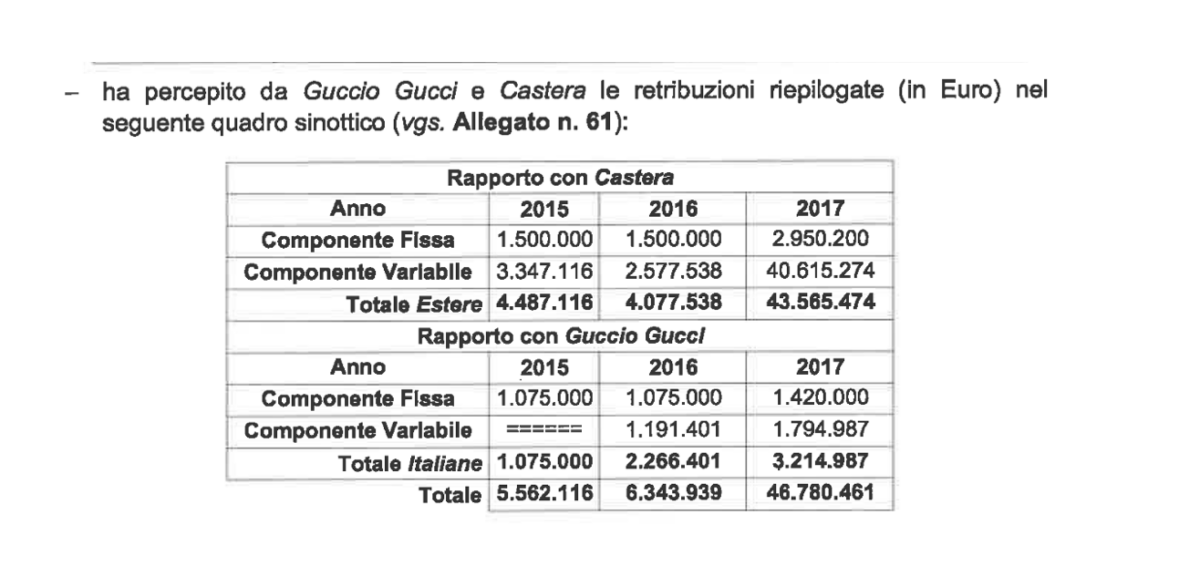
The investigations conducted by the Tax Police (“Guardia di Finanza”) reveal that, in 2017, Marco Bizzarri received a one-off payment of €43,565,474 from the Luxembourg-based Castera Sarl, which dwarfs the welcome bonus of ‘only’ €20 million promised to De Meo. Similar to the De Meo case, this jumbo payment to Bizzarri was also attributed a compensatory nature. This emerges from the description provided in the article published in Il Fatto Quotidiano on February 17th, 2022 entitled ‘THE CEO AND THE €40 MILLION BONUS‘.
This article states that «Until 2017, the CEO of Gucci was resident in Switzerland and received two salaries: one, equal to about one third of the total, paid by the Italian company Guccio Gucci Spa; the other, corresponding to the remaining two thirds, paid by the Luxembourg company Castera, also controlled by Kering. The problem is that Bizzarri actually resided in Italy. The manager himself admitted this to the Italian Revenue Agency. ‘In the report submitted to the competent authorities, Bizzarri stated that his tax domicile and residence for the years 2009 to 2015 are to be considered as established in Italy,’ reads the report of the Guardia di Finanza (Italian Tax Police). Was the manager convicted of tax evasion on his income? No, because in March 2018 he obtained approval from the Italian Revenue Agency for voluntary disclosure. Essentially, in exchange for criminal immunity guaranteed by joining the “voluntary procedure,» Bizzarri paid €16 million to regularize his position with the tax authorities for the period 2009-2015, plus taxes for the following years. The maxi penalty was actually paid by Kering. In 2017, just when Bizzarri applied for voluntary disclosure, the group controlled by Pinault paid him a bonus of €40.6 million. This was a disproportionate amount compared to the bonuses of around €4 million that the manager had received during the two previous years at the helm of Gucci.
Even in terms of maxi-compensation payments, therefore, Bizzarri wins over De Meo. And he does so by a huge margin.
On closer inspection, therefore, I think I can conclude that, contrary to what was reported by early commentators on the remuneration package offered to De Meo, the latter, when analyzed, in the base case of targets being achieved, appears to be lower than the one already applied ten years ago to Marco Bizzarri and cannot therefore be described as exceptional or particularly generous.
The €600 for Gucci’s Italian retail workers
On the subject of generosity, the recent news about Kering’s industrial relations in Italy leaves us with a bitter final thought.
At the same time as Kering announces staggering figures to attract the undisputed talent of the Group’s new CEO, and we make comparisons with the amounts already spent in the past to guarantee equally dizzying net salaries to the star player Marco Bizzarri, a thousand Italian retail workers at Gucci are in turmoil, led by their union representatives.
What are they demanding?
That Gucci honour the commitments made during the interim period of the renegotiation of the company agreement that expired on 31 December 2024 and continue to pay, also for 2025, the so-called welfare amount of €600 per person. Gucci is accused of deliberately wasting precious time without renewing the company agreement and now wanting to deny the right to the aforementioned amount until the renewal of the company agreement, which, according to the unions, is being deliberately delayed.
Applied to a workforce of 1,000 people, €600 per person is equivalent to a month’s net salary for De Meo or Bizzarri, not to mention their mega bonuses. Or it is less than 2% of what was paid to Bizzarri to regularize his tax position. Given the above, it is frankly surprising that a solution cannot be found to pay €600 to each of Gucci’s loyal retail workers.
Pietro Nenni, the heroic forerunner of the Italian trade union movements, used to say that Italy is strong with the weak and weak with the strong. But apparently this is not just a problem of Italy.



